- Home
- Steve Hockensmith
S Hockensmith - H03 - The Black Dove Page 3
S Hockensmith - H03 - The Black Dove Read online
Page 3
“Danke, Herr Scheisskerl!” I said, smiling back. “Ich werde meinen Arsch damit bei der ersten Gelegenheit wischen.”
The sandwich man waved me a friendly farewell—unaware, of course, that I’d just promised to make use of his little leaflet the next time I took seat in a privy.
“That just more of the same?” Gustav asked, pointing at the pamphlet.
I looked down and read out the title. “ ‘The Yellow Threat, How the Slant-Eyed Hordes Are Destroying America, by the Anti-Coolie League of—’ ”
“Yeah, yeah,” my brother cut me off. “More of the same.”
I left the leaflet where our Mutter taught us all such hateful things belong: in the gutter. Then Old Red and I crossed Sacramento Street, and it wasn’t just the sandwich-man’s twaddle we were leaving behind us. It was San Francisco.
With the crossing of a single street, we seemed to have stepped over the entirety of the Pacific Ocean. Mere seconds before, we might have been in the good old U. S. of A. But for all intents and purposes, we were in China now.
Colorful paper lanterns hung from every balcony like enormous, over-ripe fruit. Every other available space was covered with signs and posters, all of them adorned with the blocky, tic-tac-toe calligraphy of the Celestial Empire. The buildings fell into two camps: squat and dingy or tall-peaked and abristle with bright, elaborately curlicued woodwork.
As for the people, there was one camp and one camp only. The narrow streets were packed solid with Chinese men in black hats or skullcaps, loose-fitting tunics, and baggy trousers.
And it wasn’t just white folks who were scarce. There were hardly any women or kids, either. When we did happen to pass females venturing out of doors, many of the men ogled them openly, even hungrily—particularly if they were pretty and wrapped in vivid silks, as some were.
Gustav and I won our fair share of stares, too, for I was leading us as deep into Chinatown as I could, and it was unlikely the residents thereabouts had many visits from Stetson-bedecked cowpokes like my brother. Heads turned as we went striding past, and shopkeepers lingered in their doorways to gape at us. The few how-do nods I attempted went unacknowledged, though, and only one man bothered speaking to us: When I finally settled on a spot that seemed sufficiently seedy for our deducifying “practice,” a surly looking cabbage peddler pushed his cart away muttering something that sounded like “fink why.” Whatever it meant, I assumed it wasn’t “Make yourselves right at home.”
“Alright—here we are,” I said, throwing my arms open wide. “Pick your man and let the Sherlockery commence.”
Old Red pointed at the cabbage man as he plodded away. “I could tell you what he does for a livin’ easy enough.”
“I suppose so. But what else could you come up with? Betcha ol’ Holmes could tell us his age, weight, height, religion, hat size, favorite color, and the last time he trimmed his toe-nails. What do you see? Is he married? Does he have children? Does he smoke cigars? Gamble? Pick his nose in bed? What did he have for breakfast? Who irons his underwear? Is his underwear ironed? Hell, does he even wear underwear? Tell me something. Anything.”
“Now just hold on!” Gustav snapped. “I ain’t picked that feller for sure. I still got me a minute to choose, don’t I?”
“More like thirty seconds, now,” I started to say.
I stopped myself, though. I was starting to feel a mite guilty about how sky-high I’d stacked the deck. Yes, I’d meant to befuddle my brother. How could he possibly make head, tail, or anything in between from what he’d see in Chinatown? But I wasn’t out to make him feel like a fool. I just wanted to give him a little giddyup—and point him toward Diana Corvus.
“Take two minutes,” I said.
“That’s mighty goddamned generous of you.”
Old Red stalked away a few paces, moving his gaze slowly from one end of the block to the other.
The street was paved with cobblestones, as in the rest of the city, but the sidewalks were mere wooden planks—and rotting ones, at that. And that wasn’t all that was rotten, for there was garbage and grime everywhere.
The businesses along the block weren’t nearly as gawdy-exotic as the fruit stands, butcher shops, restaurants, and stationers lining Dupont and the other big thoroughfares. Here the stores were dingy and dank-looking, and the main stock-in-trade seemed to be shadows and dust.
Most of the men in sight seemed worn out and gray, as well—not to mention utterly unreadable. A smile or a frown or a raised middle finger I know how to interpret. But all we were getting were long, blank-faced looks, neither friendly nor hostile.
Only one fellow out of the bunch could I draw a bead on at all: the cabbage man. There’s nothing particularly mysterious about disgust. The peddler quickly disappeared, though, wheeling his cart around the nearest corner.
Old Red’s most promising subject was gone, and he knew it.
I could see my brother’s growing frustration in his clenched fists, the tense, pinched set of his shoulders, the herky-jerky way he swung his stare from one doorway to the next in search of a man he could study. A man he could know.
“God damn,” he spat.
Time was running out. His minutes had turned into seconds.
Then he snapped to his full height and said it again: “God damn!”
But the words sounded different this time. Not just louder. Brighter. Almost gleeful.
“That feller. There.”
Old Red pointed across the street at a man who’d stepped from one of the grungy little stores just a moment before. He was a smallish fellow, but that was about all I could tell, for he turned and scurried away before I could see his face. He was clearly dressed American-style, though, in a dark suit and spats—and with no queue hanging down his back.
Now, a Chinaman without his ponytail’s about as common as a horse without hooves, a fish without fins, or a banker with a heart. So it looked like Gustav had found himself a white man. And lickety-split he was Holmesing him up.
“He’s a doctor,” he said, starting across the street in pursuit. “Respected in his community, well off—until recently. He’s had him a run of bad luck that put him in a bind money-wise. Got himself knocked around, too. Bodily, I mean. But he’s pickin’ himself up again. He might not look like it, but he’s one tough little bird.”
We reached the other side of the street side by side and began hustling up the rickety sidewalk.
“Alright, I’m impressed—assumin’ it ain’t pure bullshit,” I said. “Now you wranna tell me how you deduced all that?”
“No deducifyin’ necessary,” Old Red said, and he shot me a cocked eyebrow that was, for him, the same as a cocky grin. “We know him. That’s Dr. Gee Woo Chan.”
I gaped at my brother. “Doc Chan? From the Pacific Express? It couldn’t be.”
But it could, I saw when I looked again at the man we were chasing.
He seemed stockier around the shoulders and thicker around the middle than the polished, polite Chinaman we’d met during our one and only train run as Southern Pacific police. The height was right, though, as was the hair: Chan was the only Chinaman I’d ever seen who didn’t wear a queue. The man was even limping slightly, and the last we’d heard of Dr. Chan, he’d been bashed over the head and tossed off the express we were supposed to be protecting.
“Well, hell’s bells. I do believe it is him.” I picked up my pace to a near sprint. “Hey, Doc! Stop! Doc!”
The fellow didn’t even turn around to look at me, and I started thinking Old Red was wrong after all. I kept after the man, though, already savoring the vexation I’d see on my brother’s face when “Dr. Chan” turned out to be Dr. O’Grady the dentist or Mr. Stein the encyclopedia salesman.
“Doc? Is that you? Yoo-hoo!”
I was almost close enough to reach out and touch the man now, and he finally stopped and started to turn toward me.
“ ‘Scuse me, sir,” I said. “I was wonderin’—”
I didn’t finish my sen
tence for two reasons.
First off, it was Dr. Chan.
And second, I was interrupted—by the derringer in his hand and the blast of gunfire in my face.
4
FEAST AND FAMINE
Or, Chan Tries to Make Amends and Avoid Explanations
Fortunately, it was only the literal gun fire I felt on my face—the sting of scorched powder in my eyes and a flash of heat upon my forehead. The bullet pierced not flesh but felt, tearing through the crown of my bowler and whipping the hat right off my head.
“Shit, Doc!” I shrieked, instinctively crouching down and throwing up my hands. “It ain’t our fault you got throwed off that train!”
Chan’s eyes bulged behind his round-wired spectacles.
“Big Red?”
Then he looked down, goggling at his smoking derringer as if he had no earthly idea how it came to be in his hand.
He dropped the gun to the sidewalk as my brother came dashing up to join us.
“Old Red?” Chan said. “I . . . I’m so sorry.”
“Hey, don’t apologize to him,” I said as I stood up straight again. “I’m the one who almost got his melon drilled.”
Gustav swept off his Stetson and started beating me over the head with it.
“What the hell?” I snatched the hat out of his hands. “Why are you goin’ at me now?”
Old Red pointed at the top of my head. “Your hair’s still smokin’.”
“Sweet Jesus!”
I slapped my brother’s Boss of the Plains over my ears and pulled it down so tight the brim covered my eyes. After a moment, I lifted it back up again.
“Am I out?”
“You’re out,” Gustav said, grabbing his hat back.
I ran my fingers gingerly through my hair. The clump just over my face felt bristly and warm to the touch, and the skin over my eyes had a tingle that was slowly giving way to an unpleasant throb.
“Now I know how a match feels.”
“I’m so sorry,” Chan said again, apologizing to the right Amlingmeyer this time.
“Oh, don’t worry ’bout it, Doc,” I said. “I guess I just have that effect on some people.”
“It was an accident, really. I . . .”
Chan spun around and rushed back toward the store we’d seen him leave a minute before—a small, jumble-stuffed affair with Chinese lettering over the door and what looked like a giant, hairy carrot hanging in the window.
“Wait here! Please!” he called over his shoulder.
He pulled out a set of keys, unlocked the door to the shop, and disappeared inside.
“I sure hope he ain’t goin’ back for a shotgun,” I said.
Old Red ambled over to the gutter and retrieved my hat. “Don’t worry. He’s such a sorry shot, I don’t think he could hit you with a cannon.”
He handed me the battered bowler. It had landed top-down in an pile of brownish filth, and a few stringy strands of what looked like rotting jerky still clung to the crown.
“I have been havin’ the damnedest luck with my lids lately.” I brushed the hat off and pushed a pair of fingers through its fresh, ragged holes. “Had two shot off my head in as many months. Maybe I oughta make like Johnny Appleseed and take to wearin’ a tin pot.”
“Couldn’t look any dumber on you than that derby did.”
“Awww, you’re just old-fashioned.”
Off behind my brother, I noticed several merchants still staring at us from in front of their stores.
“Don’t rush over to help me all at once, now!” I called to them. “You’ll step on each other’s toes!”
I turned the other way and found more of the same: shopkeepers and their customers watching us warily, making no move to lend a hand or take to their heels, either one.
I held up the bowler.
“Any of y’all wanna buy a hat?”
I got no takers—or any reaction of any kind, for that matter. Just more stares.
“Quite an assortment of humanitarians they got around here.”
“They’re used to mindin’ their own business, that’s all,” Gustav said. He knelt down and picked up Chan’s discarded derringer. “Ain’t that different from some of the cow-towns we been through.”
“I suppose . . . only wouldn’t the local law have come around by now to see what’s what?” I took another look up and down the street and saw nothing but Chinamen, and not a one of them in blue. “I know Frisco’s supposed to be a wide-open town, but I wouldn’t think you could fire off a gun without bringin’ at least one copper a-runnin’.”
My brother shrugged. “Maybe the po-lease don’t hear so good if the shot’s comin’ from Chinatown.”
Chan came bustling out of his shop, a small, silver tin clutched in his hands.
“Here you go, Big Red.” He thrust the tin out toward me. “A medicinal balm. It should keep the skin from peeling.”
“Skin? Peelin’?” I touched my forehead lightly, my fingertips barely brushing against flesh. The sting was strong enough to make me wince. “Damn. Did my scalp get all scorchy?”
“Well, I don’t know if it’s ‘scorchy,’ ” Chan said miserably, still holding out his “balm.” “But you do have a little . . . color up there.”
“Looks like someone tried to iron out your skull,” Old Red said.
“Oh, that is just dandy.”
I eyed Chan’s tin suspiciously. In its center was a dollop of waxy, green paste. It looked like tallow mixed with mashed peas.
“You say that’ll help it heal up?”
“Oh, yes.” Chan scooped out some of the salve and stretched his goop-covered fingers up toward my face. “Please. Allow me.”
I let him smear the stuff over my forehead. Almost instantly, the stinging faded. There was a price to pay, though.
“Good god, Doc,” I said, giving the air a sour sniff. “What’s in that stuff, anyway?”
“Herbs. Ground roots.” Chan stepped back and inspected his handiwork—which gave him an excuse not to look me in the eye. “This and that.”
“Well, the ‘this’ stinks and the ‘that’ reeks.” I jammed my ruined derby down over my head. It chafed against my burn, but I was alright with some discomfort if it would stifle the stench. “How do I look?”
“Fine,” said Chan.
“Ridiculous,” said Gustav.
I sighed.
“Truly . . . I am so very sorry,” Chan said.
I waved a hand dismissively. “Oh, it was an accident. No need for more apologies.”
“It’d be good to hear a reason, though,” Old Red said.
For the first time, Chan seemed to be aware that we had an audience. His gaze darted up and down the street, at the other Chinamen out gawping at us like kids watching a circus parade.
“Yes. Certainly. Perhaps we could discuss it over a meal. I was just heading out for lunch, and I’d be honored if you’d join me. As my guests, of course. To make up for what happened.”
“Alright,” Gustav said with a nod. “Thank you.”
“Yeah, sounds good, Doc,” I threw in. “Why, if it’ll get us a free meal, you can take a potshot at me any time.”
Chan smiled weakly and headed back to close up his shop again. I caught a little glimpse of the inside, and it sure didn’t seem like any doctor’s office I’d ever seen. Bins and baskets lined the walls, all of them full of what appeared to be nuts, berries, and roots. Given that Chan called himself a doctor, I assumed it was a pharmacy . . . though one that looked like it was run by and for squirrels.
When Chan was done locking the door, he led us around the corner to a quiet, dimly lit restaurant—and one of the finest meals I’ve ever had.
Now, Chinese cooking was nothing new to me and my brother. Every city of any size in the West has its share of chop suey shacks, and Old Red and I track them down whenever we can, for Chinese food sports twin virtues men of our means can ill afford to ignore: It’s hot and it’s cheap.
But the eatery Chan took u
s to was a far cry from the drafty lean-tos we’d come to expect when sniffing out our next plate of chicken chow mein. It was clean, for one thing. And fancy, too—brightly colored tapes-tries hung from the walls, and every last bit of woodwork was festooned with ornate swirls and curlicues. The other customers were a prosperous lot, by the look of them—plump, chatty, and cheerful. A few were even dressed American-style, like Chan.
All stared openly as we took our seats.
Chan did the ordering in his mother tongue, talking to the waiter so long he may as well have saved himself the bother and just said, “One of everything, please.” And indeed that’s what it looked we were getting when the food started showing up. We were served soup, rice, dumplings, buns, and such a bewildering array of vegetables and meats I quickly lost track of what was what.
Chan whipped up quite the wind as the plates came and went, rattling on about how this or that dish had been prepared, which ingredients were local and which imported, the proper way to hold the “chopsticks” the Chinese did their eating with, and the special healing properties of a good cup of hot tea. Everything, it seemed, except why he’d tried to put a hole in my noggin not a half hour before.
Of course, I was too busy packing on fat for the winter to worry about pinning Chan down. But Gustav’s got about half the appetite I do and four times the curiosity. So naturally he was first to finish with the food and dig into the mystery.
“Thank you, Dr. Chan. That was a right tasty meal. I’m just glad my brother could be here to share it with us. You know . . . him almost havin’ his head shot off and all.”
Chan’s shoulders sagged, and it seemed only something taut and unyielding in his gut kept him from slumping face-first into a mound of white rice.
“Yes. That was most unfortunate.”
The Chinaman’s usually light accent thickened, his voice suddenly sounding strained, labored, as if the words were sticking to his tongue like nut butter.
“I suppose I’ve been . . . on edge ever since my experience on the Pacific Express.”
“I understand entirely, Doc. It’s mighty unsettlin’ seein’ the Reaper take a swing at you.” I pointed at the last pork bun. “Anyone got their eye on that?”

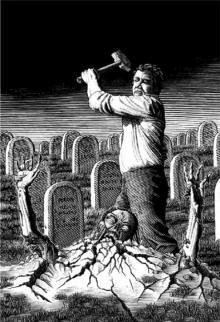 Dawn of the Dreadfuls
Dawn of the Dreadfuls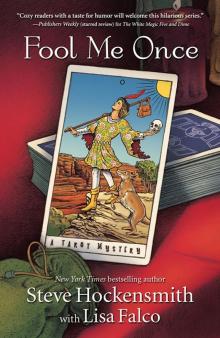 Fool Me Once: A Tarot Mystery
Fool Me Once: A Tarot Mystery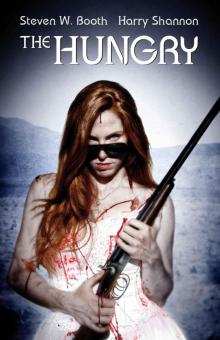 The Hungry
The Hungry Naughty: Nine Tales of Christmas Crime
Naughty: Nine Tales of Christmas Crime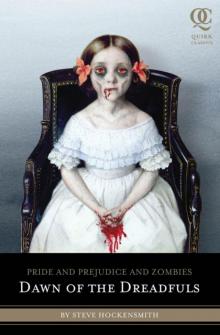 Pride and Prejudice and Zombies: Dawn of the Dreadfuls papaz-1
Pride and Prejudice and Zombies: Dawn of the Dreadfuls papaz-1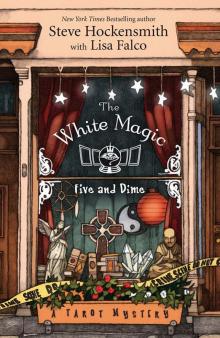 The White Magic Five & Dime (A Tarot Mystery)
The White Magic Five & Dime (A Tarot Mystery)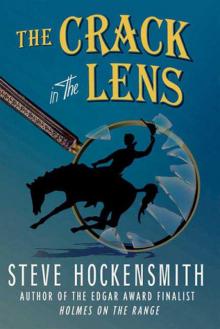 The Crack in the Lens
The Crack in the Lens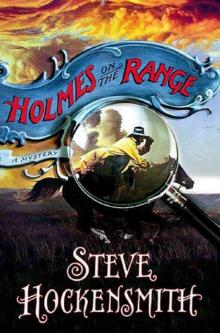 Holmes on the Range
Holmes on the Range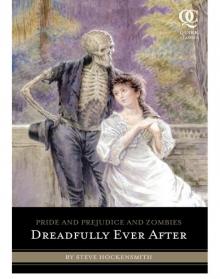 Dreadfully Ever After
Dreadfully Ever After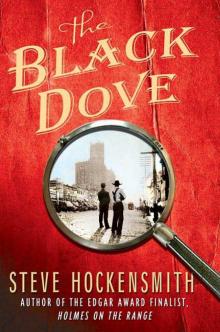 S Hockensmith - H03 - The Black Dove
S Hockensmith - H03 - The Black Dove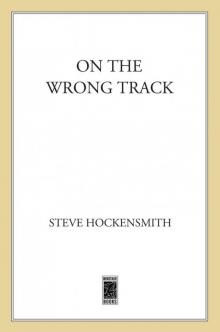 On the Wrong Track
On the Wrong Track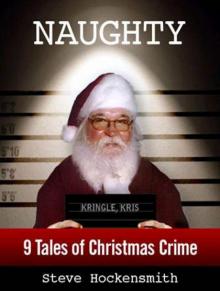 Naughty-Nine Tales of Christmas
Naughty-Nine Tales of Christmas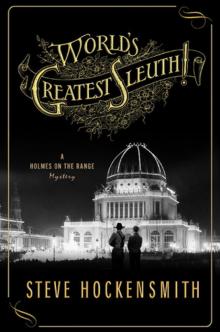 World's Greatest Sleuth!
World's Greatest Sleuth!